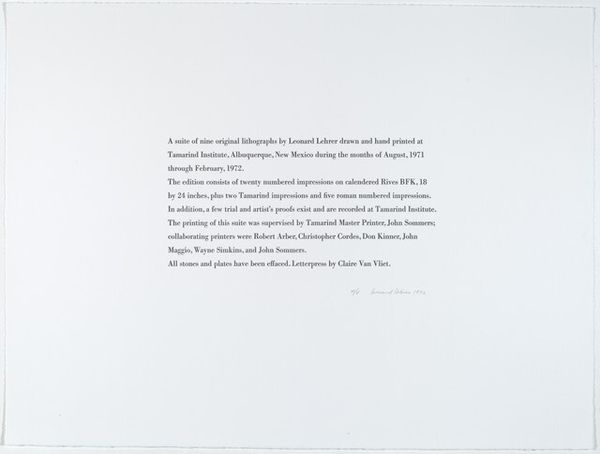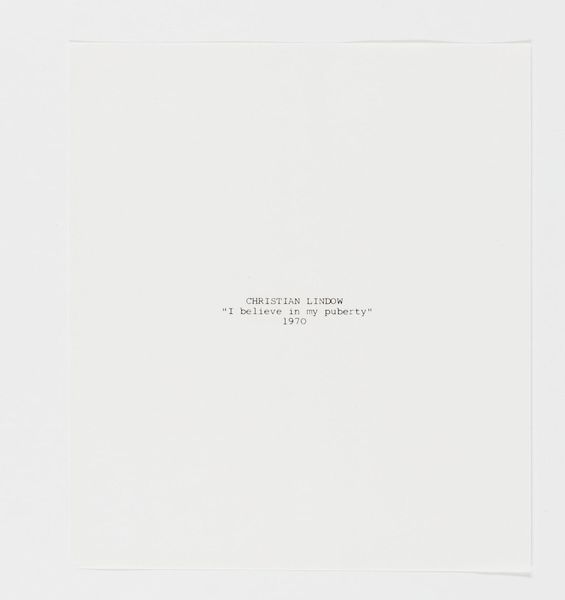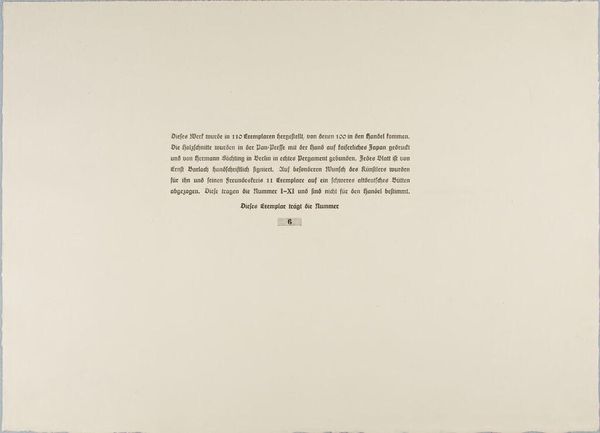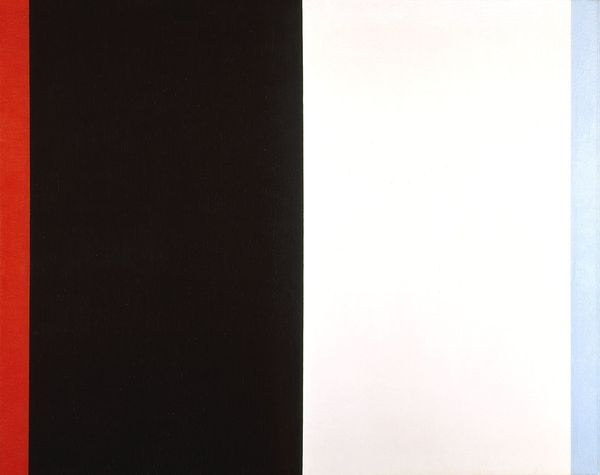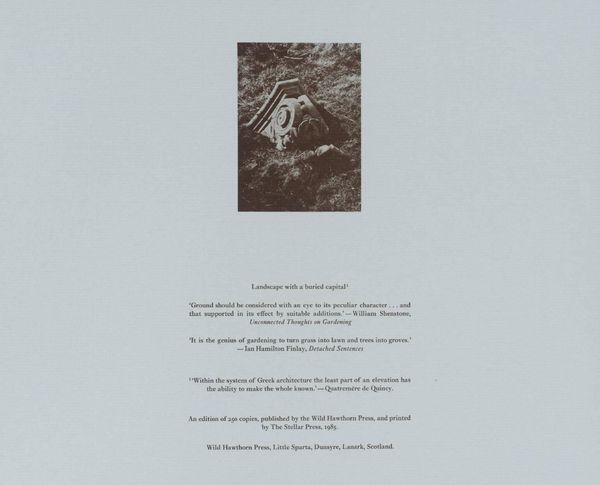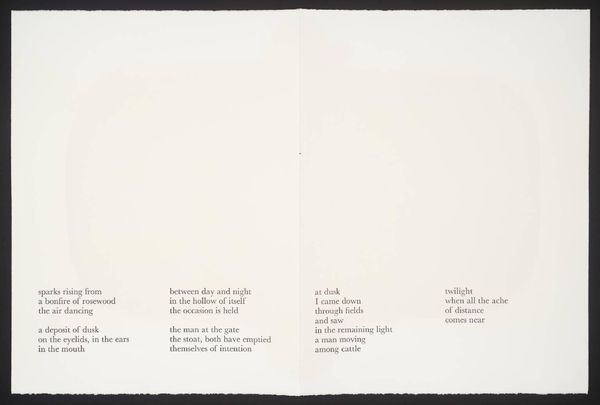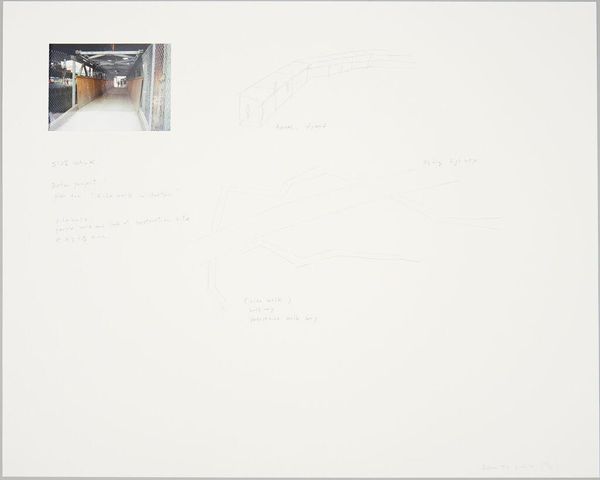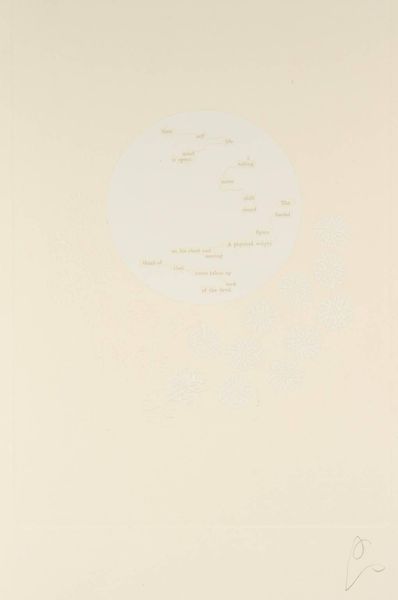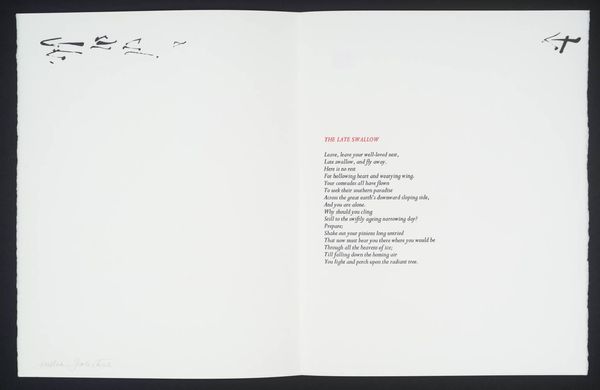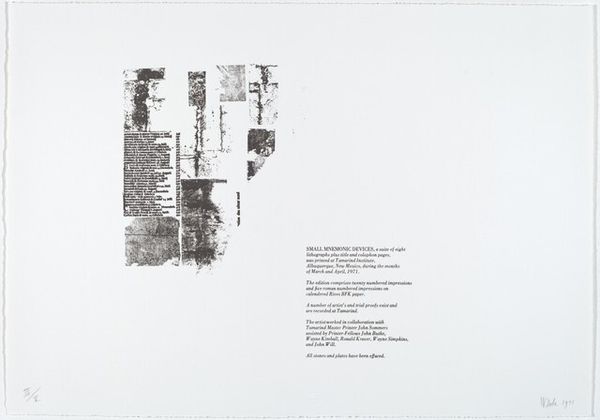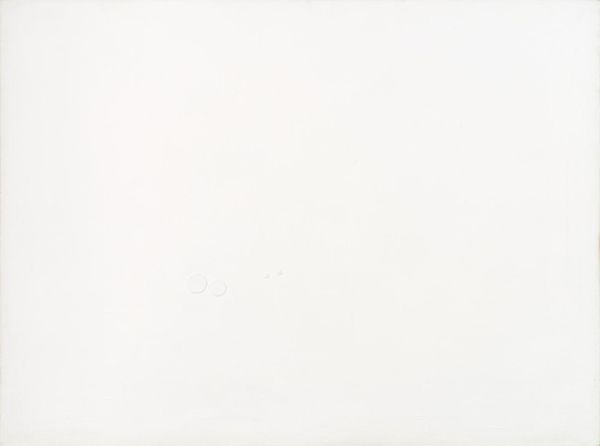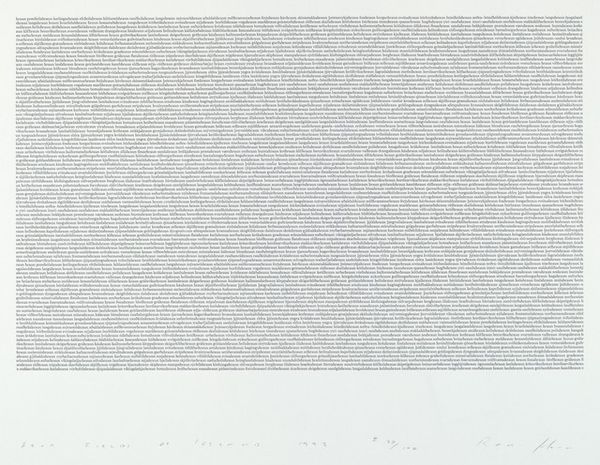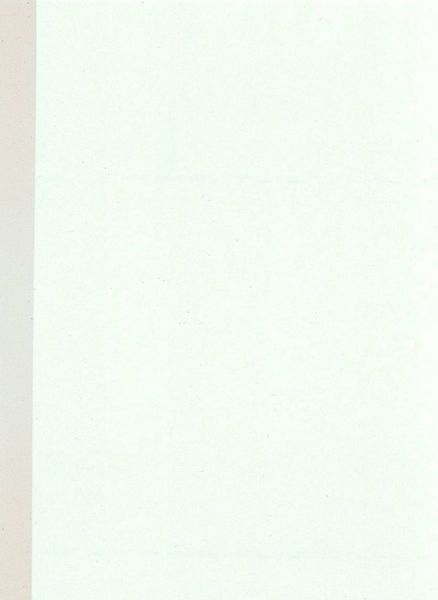![[no title] by Liam Gillick](/_next/image?url=https%3A%2F%2Fd2w8kbdekdi1gv.cloudfront.net%2FeyJidWNrZXQiOiAiYXJ0ZXJhLWltYWdlcy1idWNrZXQiLCAia2V5IjogImFydHdvcmtzL2E5ODI0OTFlLTQyYzAtNGEyNy05OWUyLTdmZTFkN2QyNDFlNy9hOTgyNDkxZS00MmMwLTRhMjctOTllMi03ZmUxZDdkMjQxZTdfZnVsbC5qcGciLCAiZWRpdHMiOiB7InJlc2l6ZSI6IHsid2lkdGgiOiAxOTIwLCAiaGVpZ2h0IjogMTkyMCwgImZpdCI6ICJpbnNpZGUifX19&w=3840&q=75)
Dimensions: image: 470 x 612 mm
Copyright: © Liam Gillick | CC-BY-NC-ND 4.0 DEED, Photo: Tate
Curator: Liam Gillick, born in 1964, created this intriguing piece – it's essentially text on paper. My initial reaction is of something sparse and secretive. Editor: Secretive indeed! It reads almost like film credits, focusing on the material process of creation. We have names, titles, and production companies, all components of film production. Curator: Yes, the text alludes to power and concealment, with names like McNamara and lines about having something to hide. It’s a play on institutional critique and the very structures that dictate what we see. Editor: Right, and the medium is the message here. The cold, printed text reflects a certain bureaucratic detachment, mirroring the themes of control and obfuscation. Curator: It makes you wonder what exactly is being hidden and who is doing the hiding. Gillick is so good at using language to destabilize meaning. Editor: Precisely. It's not just what’s written, but how it’s presented, prompting us to question the mechanisms behind seemingly simple information. Curator: A simple white piece of paper and text opens such a rabbit hole of questions. I love it! Editor: Absolutely. Gillick makes us acutely aware of the production of knowledge and the power dynamics involved.
Comments
Join the conversation
Join millions of artists and users on Artera today and experience the ultimate creative platform.
tate 10 months ago
⋮
Other Men's Flowers is a portfolio of text-based prints by fifteen London artists curated by Joshua Compston (1970-96). It was printed by Thomas Shaw and Simon Redington and published by Charles Booth-Clibborn under his imprint, The Paragon Press. Compston took the title, Other Men's Flowers, from an anthology of wartime poetry compiled by Field-Marshal Viscount Wavell (1883-1950) of the same title (published 1944). Wavell had derived the phrase from a well-known quotation attributed to French moralist Montaigne (Michel Eyquem de Montaigne, 1533-92), 'I have gathered a posie of other men's flowers and nothing but the thread which binds them is my own' (quoted in Cooper, p.115). Montaigne's original sentence, published in his Essais (Essays) in 1580, provided an apparently modest disclaimer, anticipating criticism of the originality of his ideas. For Compston, it provided an apt poetic metaphor for the role of the curator. Other Men's Flowers was launched at a party on 23 June 1994 in a derelict sawmill close to Hoxton Square, East London, a centre for young British artists at that time. Compston wrote in his press release: The project has produced an exciting and innovative publication that intrinsically embodies the elegant but underused printing technique of letterpress … that has allowed and encouraged many hitherto solely image-based artists an opportunity to operate within the realms of 'copy writing', providing them with a platform from which to sound off any phrase, slang discovery, polemical essay or related literary form … the participants produced works that responded to the given brief of a letterpress printed text piece. (Quoted in Cooper, p.116.) Letterpress is a form of relief printing in which paper is pressed, by either a large flat plate or rollers, onto previously inked type. In the event, nine of the fifteen participants adhered to Compston's letterpress brief. Of the remaining six, four produced screenprint images, one a lithograph and one a monotype. The individual artists used different types of paper, all of the same size, some working in landscape and others in portrait format. The portfolio was produced in two slightly different editions. The 'book' edition, of one hundred copies plus twenty artist's proofs, consists of fifteen prints, three title pages and a colophon page signed by all the artists, presented in a box. Tate's copy is number twelve in this edition. The 'portfolio' edition of fifty, plus twenty artist's proofs, differs only in that the prints are individually signed. The three title pages were designed by Compston and contain the following: the title words in large blue capitals, the words 'An Introduction to Other Men's Flowers' above a drawing of a pointing hand in the style of an Edwardian cartoon, the words 'Please Keep Out/ Foot & Mouth Precautions' in large red capitals copied from a National Union of Farmers poster of the 1960s. The colophon page, on which the artists, curator, printers and publishers are named and the editions described, bears the circled logo 'OMF' in red. This logo is a typical Compston mechanism and imitates his personal 'FN' (Factual Nonsense) logo. Compston set up Factual Nonsense, his gallery and project space, in Shoreditch, London in October 1992, shortly after graduating in art history from the Courtauld Institute in London. Aiming to establish a cultural revolution of some kind, he intended his space to be 'a forum for all elements disenchanted with the laxity and ennui of current thinking' (quoted in Cooper, pp.39-42). He befriended many members of the group of young British artists (or yBas) whose work was just coming to prominence in London at that time. Between 1993 and his tragically premature death in 1996 at the age of twenty-five, he organised exhibitions and performative day events in Hoxton Square, as well as commissioning the pages of Other Men's Flowers from his artist friends.
